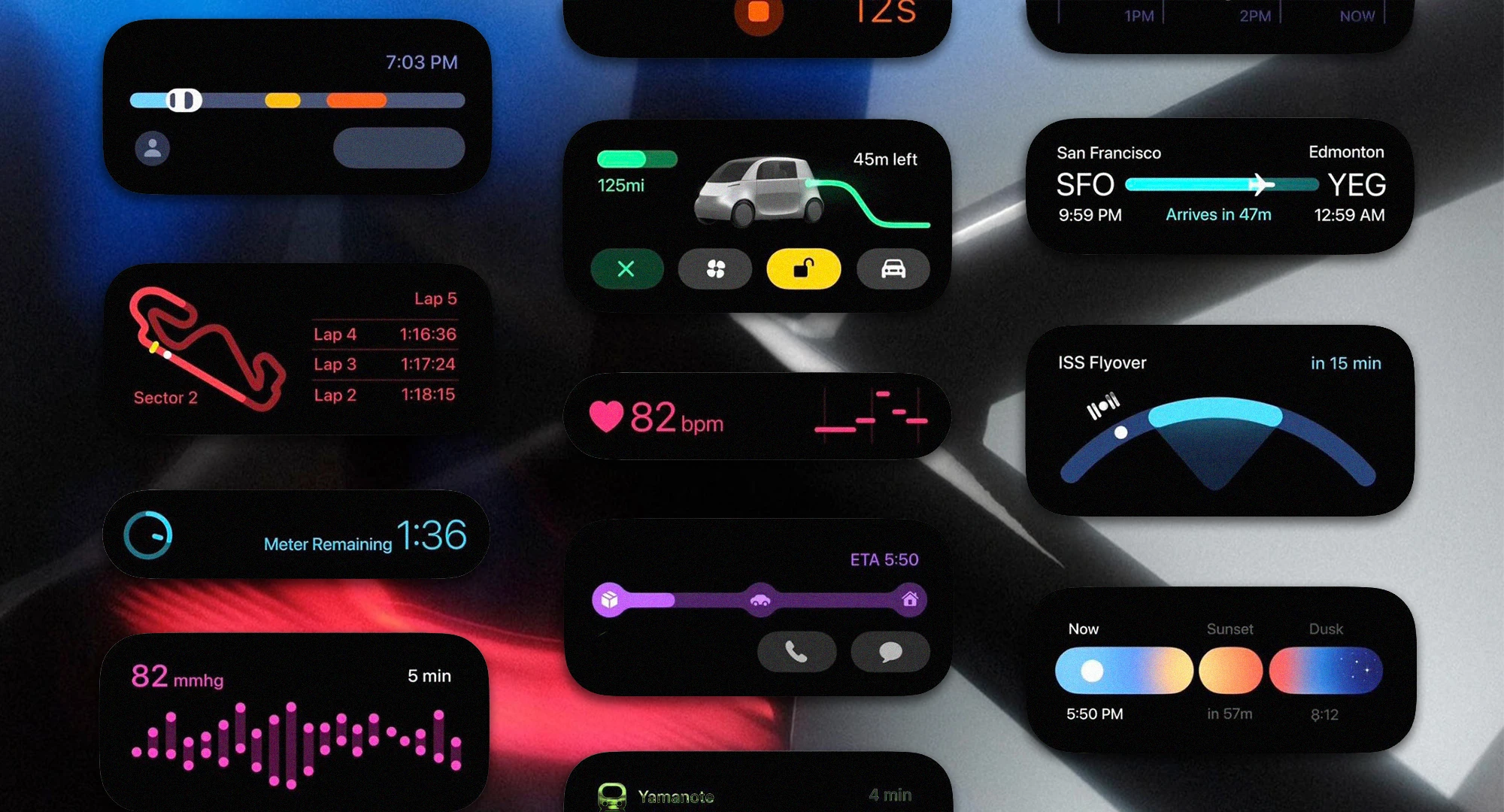
Top Insurance Software Development Agencies to Work With - February 2026
Introduction
The insurance industry has undergone significant transformation over the past year, driven by changing customer expectations, increased regulatory demands, and rapid digital innovation. As we enter February 2026, choosing the right Insurance Software Development Agency is more critical than ever for staying competitive and future-ready.
While many insurance companies are expanding their internal digital teams, partnering with an Insurance Software Development Agency remains essential. These agencies offer specialized expertise, help overcome bandwidth constraints, and often deliver better cost efficiency. In the sections below, we’ll reveal the top 10 Insurance Software Development Agency options leading the industry today.
Top 10 Insurance Software Development Agencies
1. G&Co.
G&Co. is a global insurance software development company that delivers custom insurance software development for enterprise insurers, brokers, and insurtech disruptors.
Known for its strategy-led approach, G&Co. builds scalable insurance agency software and customer-first digital experiences tailored to the needs of modern insurers. Its expertise includes creating cloud-based insurance CRM software, mobile-first insurance client management software, and integrated insurance customer management software. G&Co. has worked with Fortune 500 insurers and top-tier agencies to implement high-impact insurance software solutions across underwriting, claims, and customer engagement. Their ability to merge design, tech, and strategy makes them one of the most reliable insurance software development companies in the industry.
G & Co. is a minority business enterprise (MBE), as certified by the National Minority Supplier Development Council (NMSDC). If diversity inclusion is a part of your supplier process, contact us—we may be a great fit for your enterprise.

2. DICEUS
DICEUS delivers end-to-end insurance software development services with a focus on core system modernization and automation.
As a custom insurance software development firm, DICEUS is known for building high-performance insurance CRM systems and client portals that improve customer satisfaction and operational efficiency. They specialize in enterprise-grade insurance company software solutions such as claims processing systems, policy admin platforms, and digital onboarding tools. DICEUS has served insurance providers across the U.S. and Europe and is often chosen for its proven delivery frameworks and robust compliance with insurance industry software solutions.
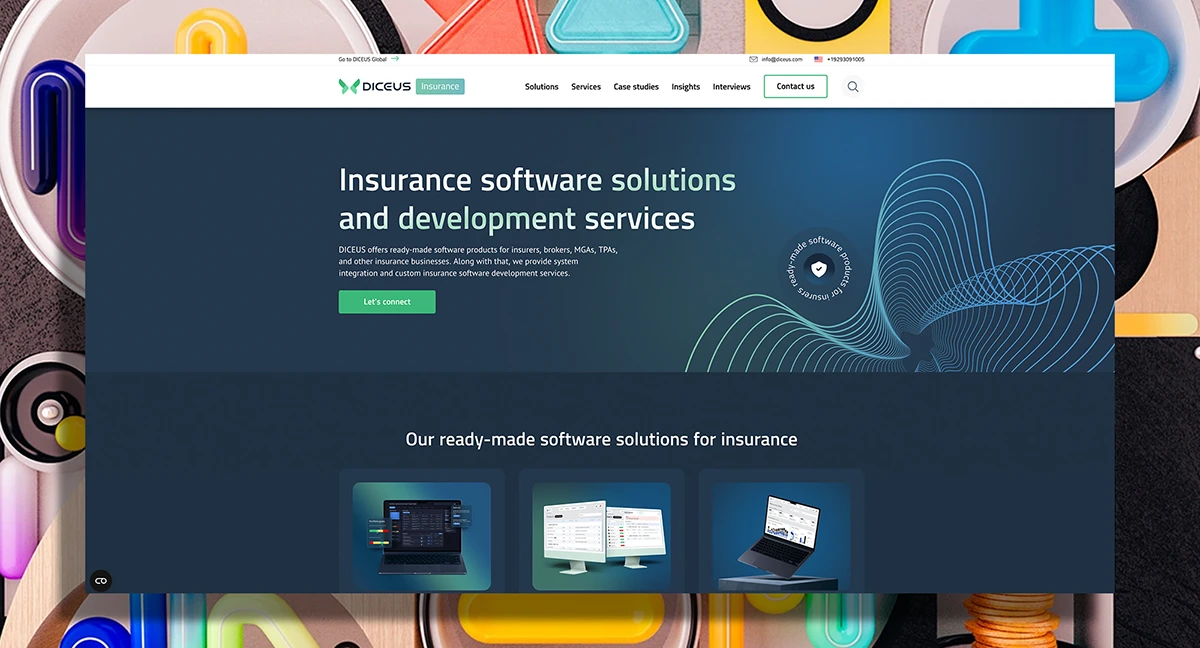
3. Intellectsoft
Intellectsoft is a leading insurance software development company that blends emerging technologies with insurance industry demands.
With experience across software development insurance platforms, Intellectsoft builds blockchain-powered claims systems, AI-driven underwriting tools, and omnichannel insurance agency management software. Their insurance CRM software integrates easily with legacy systems, enabling seamless digital transformation for carriers and insurtech firms alike. Intellectsoft has partnered with major global insurers and is known for its custom insurance software development focused on innovation and scalability.
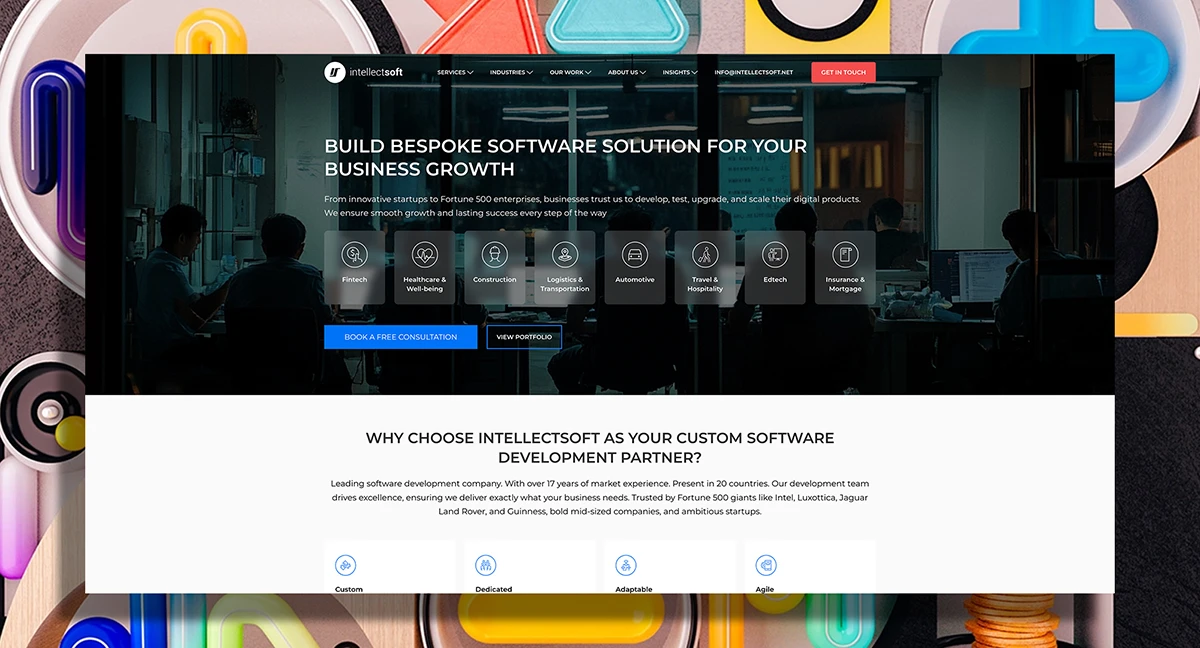
4. Innowise Group
Innowise Group provides custom insurance software development services that help insurers digitize and streamline their operations.
They develop comprehensive insurance client management software and CRM platforms tailored to unique policyholder journeys. Known for working with mid-sized insurers and startups alike, Innowise Group’s offerings include everything from policy lifecycle automation to advanced analytics dashboards. Their role as a flexible insurance software company allows them to deliver solutions that enhance both back-office and customer-facing capabilities.
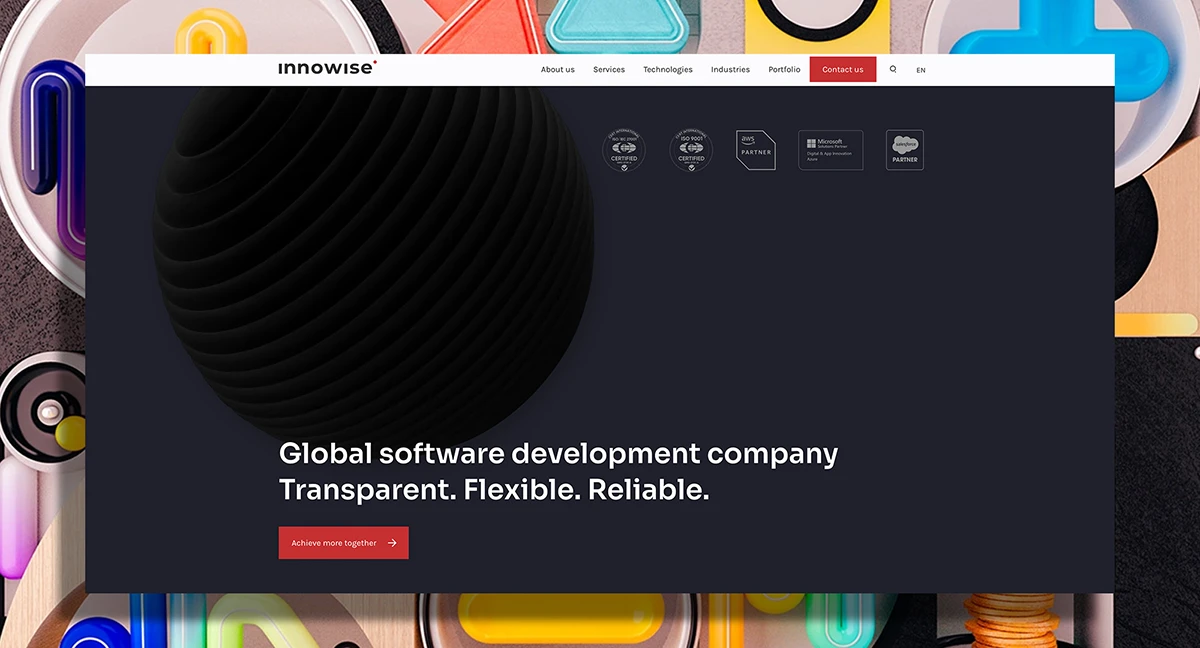
5. ELEKS
ELEKS is a software development insurance partner specializing in high-end technology solutions for the insurance sector.
They offer tailored insurance CRM software, predictive analytics tools, and enterprise-grade mobile apps for agents and underwriters. ELEKS has supported digital transformation for global reinsurers, insurance brokers, and regulatory bodies. Their core strength lies in building modular insurance software solutions that align with evolving market demands and compliance standards.
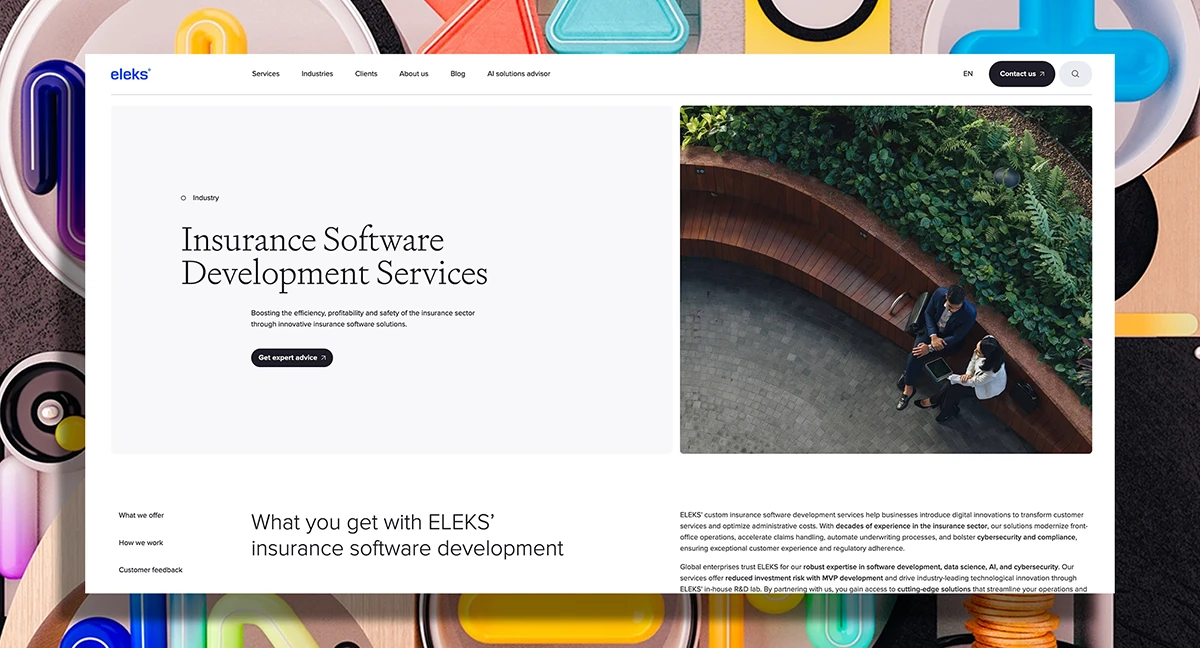
6. Oxagile
Oxagile is a technology-driven insurance software development company with expertise in AI, IoT, and big data applications.
Focused on delivering smart insurance company software solutions, Oxagile helps insurers implement real-time risk assessment tools, telematics platforms, and intelligent claims automation. They have worked with U.S. P&C insurers and global health providers, providing advanced insurance CRM systems that enhance customer engagement and data visibility. Their insurance industry software solutions are especially valuable for firms looking to personalize customer experiences at scale.
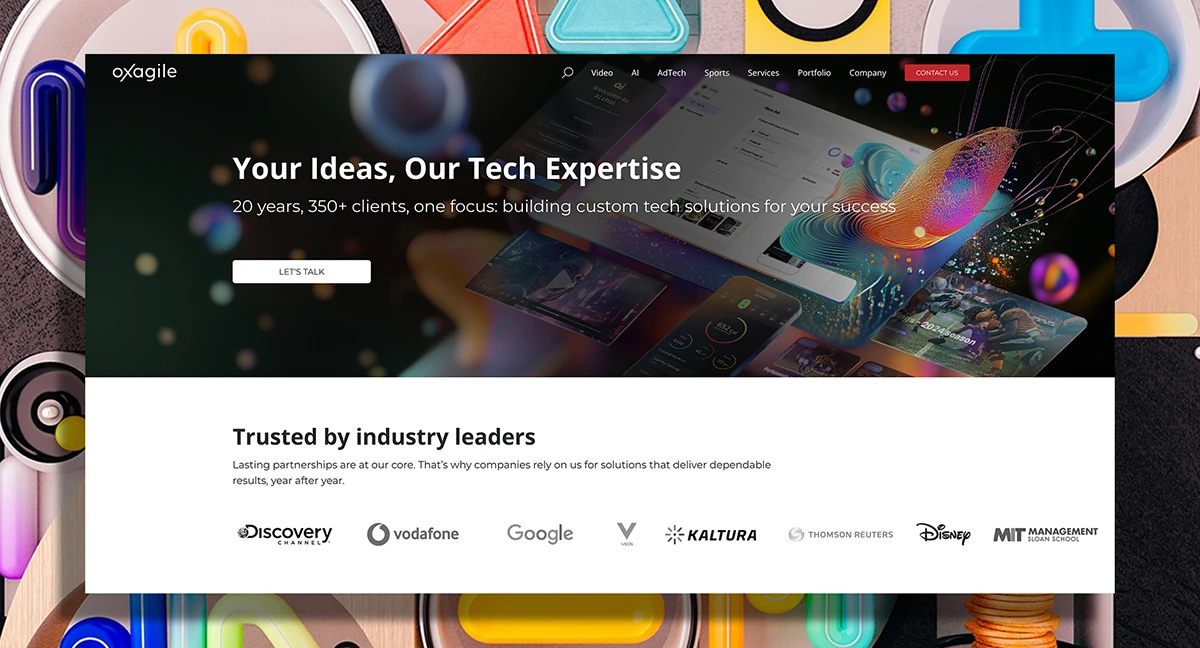
7. MindK
MindK develops custom insurance software development services tailored to the needs of digital-first insurance companies and insurtech startups. Their strengths lie in building cloud-native insurance client management software and insurance CRM tools with robust integration capabilities. MindK has partnered with brokers, underwriters, and reinsurers to deploy scalable insurance software companies’ platforms for digital enrollment, claims tracking, and policy management. Known for their collaborative approach and fast time-to-market, MindK is ideal for firms pursuing innovation with agility.
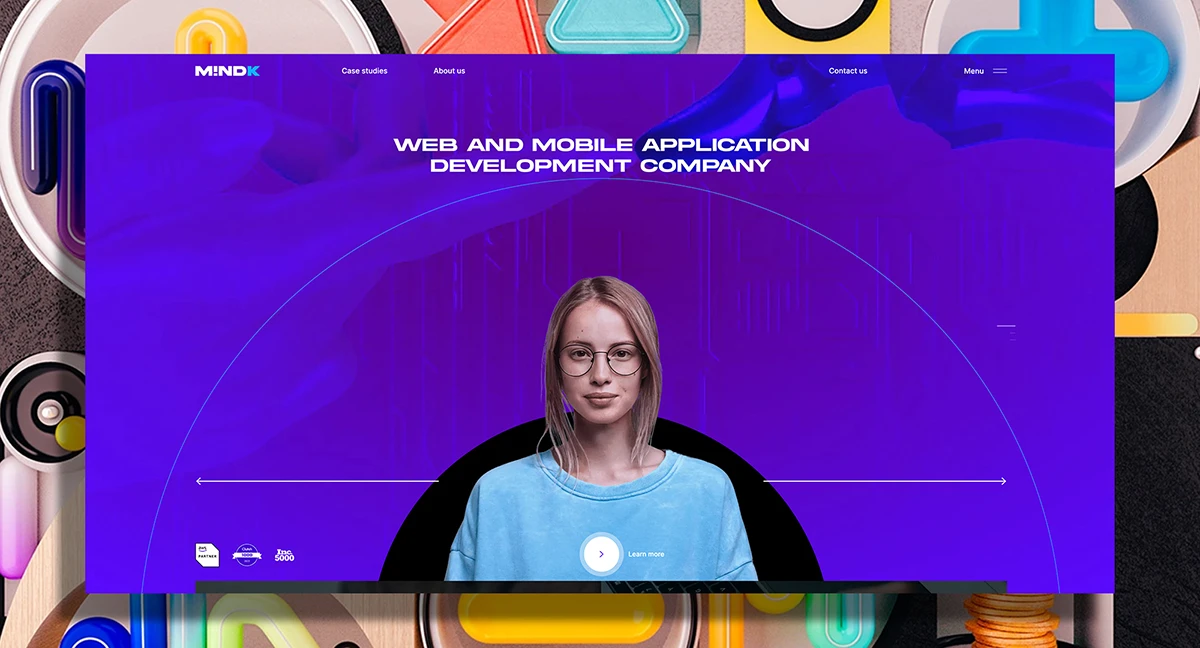
8. Itransition
Itransition is an experienced insurance software company that helps insurers automate operations and improve customer interactions.
With insurance CRM software, client portals, and backend optimization tools, Itransition serves both legacy insurers and digital-native insurance startups. Their insurance agency software emphasizes user experience and data interoperability, supporting everything from quote generation to automated renewals. Itransition is widely recognized for its ability to modernize outdated systems while supporting innovation in insurance customer management software.

9. Avenga
Avenga delivers full-cycle insurance software development services with a focus on modernization and CX transformation.
This insurance software development agency works with global insurers to create seamless customer journeys through AI-driven chatbots, digital policy platforms, and automated claims tools. Avenga’s insurance agency management software is highly customizable and integrates effortlessly with existing core systems. Their clients span Europe and North America, including major health and life insurance carriers.
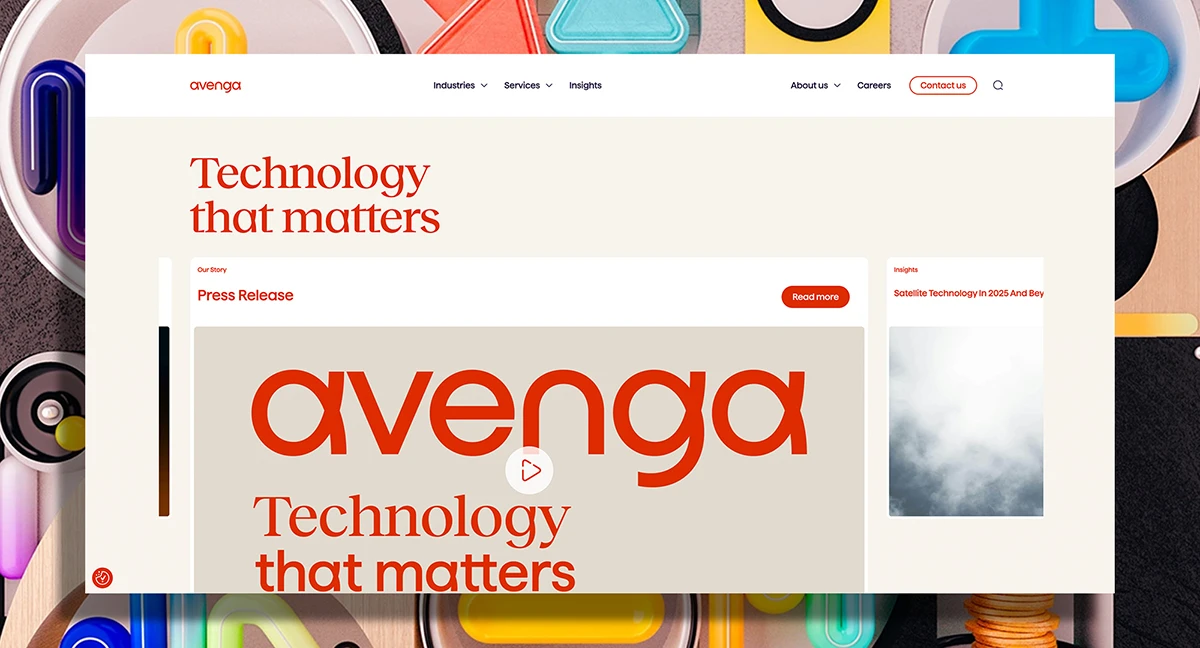
10. InsureTech Express
InsureTech Express is a specialized insurance software development company catering exclusively to the life and annuity market.
They provide niche insurance CRM software, quoting tools, and e-application platforms that improve agent productivity and customer experience. As a focused insurance software company, they’re known for delivering insurance agency software that supports regulatory compliance and seamless integration with industry-specific tools like iPipeline. InsureTech Express is ideal for life insurance carriers looking to modernize quickly with purpose-built software.
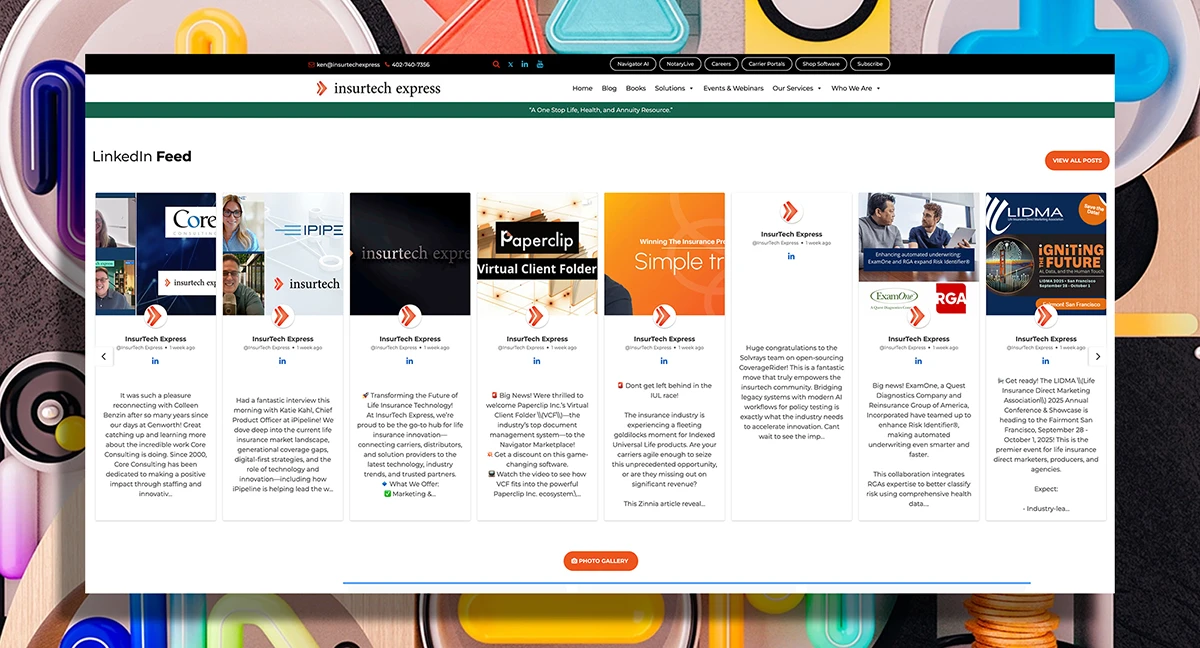
What Is an Insurance Software Development Agency?
An insurance software development agency is a specialized technology partner that designs and delivers insurance software development services tailored to the unique needs of insurers, brokers, and insurtech firms. These agencies develop comprehensive platforms including insurance agency software, insurance CRM software, insurance client management software, and insurance agency management software. Their expertise spans policy administration systems, claims automation, data analytics, and customer engagement tools. By leveraging custom insurance software development and integration capabilities, these firms enable carriers to modernize legacy systems, increase operational efficiency, and meet evolving regulatory and customer demands in the competitive insurance landscape.
Selecting the right insurance software development agency can dramatically enhance an insurer’s ability to operate efficiently, adapt to market shifts, and deliver superior customer experiences. These specialized firms bring deep expertise in building insurance software solutions that address every facet of the insurance lifecycle—from policy administration and claims processing to digital onboarding and data-driven decision-making.
With robust capabilities in insurance software development services, these agencies design and implement custom insurance software development tailored to meet the complex needs of carriers, brokers, and insurtech companies. Whether it’s developing insurance CRM software, integrating insurance client management software, or modernizing legacy systems with scalable insurance agency management software, the best insurance software development companies offer transformative value. The following section explores the core capabilities these agencies provide to empower digital transformation across the insurance sector.
What Services Do Insurance Software Development Agencies Provide?
Custom Insurance Software Development
Custom insurance software development enables insurers to build tailored platforms that address their unique operational and customer requirements. An insurance software development agency will work closely with carriers, brokers, and insurtechs to design scalable solutions across underwriting, claims, and policy management. These platforms often incorporate insurance CRM software, insurance client management software, and insurance customer management software to centralize data, streamline workflows, and support seamless digital experiences. Custom development ensures alignment with business goals, regulatory standards, and integration needs.
Insurance CRM Software Implementation
Insurance CRM software implementation is critical for improving customer acquisition, engagement, and retention. Insurance software development companies build and deploy advanced CRM systems that consolidate policyholder data, automate follow-ups, personalize communications, and integrate with marketing and support tools. By leveraging insurance software development services, clients gain visibility into customer journeys while optimizing sales and service workflows. These solutions enable insurers to respond more effectively to client needs and gain a competitive advantage in a relationship-driven industry.
Claims Management Software Development
A top insurance software development company offers claims management systems that automate and accelerate the claims lifecycle—from FNOL (first notice of loss) to resolution. These platforms use automation, data validation, and real-time tracking to reduce processing times and improve accuracy. With deep expertise in software development insurance, agencies ensure that claims systems integrate securely with core platforms and third-party tools. These insurance software solutions enhance transparency, customer satisfaction, and operational efficiency.
Insurance Policy Administration Systems
Policy administration is central to any insurance operation, and agencies develop full-featured insurance agency software to manage the lifecycle of policies across product lines. These systems support rating, quoting, issuing, endorsements, renewals, and cancellations. As part of insurance software development services, agencies tailor these systems for scalability, compliance, and ease of use. These insurance company software solutions often integrate with client portals, payment gateways, and back-office tools for end-to-end automation.
Insurance Agency Management Software
Insurance agency management software supports brokers and agents by consolidating lead tracking, commission handling, client communications, and document management in a single interface. Insurance software development companies design these platforms to help agencies grow their book of business while reducing administrative overhead. With the support of custom insurance software development, clients gain access to real-time insights, streamlined quoting, and automated workflows—all tailored to the needs of modern agency operations.
Insurance Client Management Software
Insurance client management software ensures insurers and agencies maintain accurate, up-to-date client records, preferences, and interaction history. Insurance software companies develop intuitive systems that centralize data for sales, service, and support teams. These platforms improve cross-selling opportunities, customer satisfaction, and compliance with privacy regulations. As part of insurance software development services, client management solutions are often integrated with CRM tools and customer portals for full visibility.
Insurance Customer Portals
Insurance software development agencies create customer portals that allow policyholders to access account information, make payments, file claims, and manage policies online. These digital front doors are designed to be mobile-responsive, secure, and user-friendly. A well-built portal—enabled by insurance software development—reduces call center load, increases customer engagement, and enhances self-service capabilities. Insurance customer management software embedded within these portals allows for a more personalized user experience.
Data Analytics & Reporting Solutions
Agencies offer advanced analytics and reporting tools that help insurers make data-driven decisions across underwriting, pricing, claims, and customer behavior. These tools are integrated into insurance industry software solutions and extract actionable insights from structured and unstructured data. Through insurance software development services, firms can build dashboards and automated reporting systems tailored to executive, operations, and compliance needs, boosting efficiency and transparency.
Legacy System Modernization
Legacy modernization services focus on replacing outdated insurance software systems with modern, scalable, and secure architectures. Insurance software development companies refactor monolithic applications into cloud-based microservices that are easier to maintain and evolve. This includes transitioning to modern insurance agency management software or integrating newer insurance CRM software with existing platforms. The goal is to reduce risk, increase speed-to-market, and enable ongoing innovation.
API Integration and Third-Party Systems
To enable seamless operations, agencies provide API integration services connecting insurance software solutions with third-party tools such as payment processors, regulatory databases, telematics providers, and marketing platforms. Custom insurance software development ensures compatibility, security, and performance across these integrations. This is essential for building flexible and interoperable insurance company software solutions that support automation and scale.
Let’s kickstart the conversation and design stuff people will love.

How Long Does an Insurance Engagement Take to Complete?

Understanding the typical timeline of an engagement with an insurance software development agency is essential for setting clear expectations and aligning project goals. Whether the focus is on building a new insurance CRM software platform, modernizing legacy systems, or deploying insurance agency management software, project timelines can vary based on scope, complexity, and integration requirements.
This section outlines the general phases and estimated durations of a full-cycle insurance software development engagement. By breaking down each stage—from discovery and planning to deployment and support—readers will gain insight into how leading insurance software development companies deliver tailored, high-impact insurance software solutions within realistic timeframes.
Project Scope and Complexity
The overall scope and complexity of an insurance software development project are key determinants of the engagement timeline. Projects focused on custom insurance software development with multiple modules—such as claims automation, underwriting engines, and customer portals—require longer timelines due to detailed requirements gathering, integration layers, and compliance protocols. Insurance software development companies typically allocate additional time for complex workflows, multiple stakeholder approvals, and scalability planning across enterprise-grade insurance software solutions.
Type of Insurance Software Being Built
The category of software—such as insurance CRM software, insurance client management software, or policy administration systems—can significantly impact duration. Building end-to-end insurance agency software or insurance agency management software generally takes longer than implementing standalone insurance customer management software or reporting dashboards. Insurance software development agencies often allocate time based on functionality depth, third-party dependencies, and core insurance business logic involved in each software category.
Customization vs. Off-the-Shelf Configuration
Custom insurance software development projects take longer than engagements based on modifying pre-built frameworks. A fully customized insurance software development service typically involves weeks of discovery, UX/UI design, development sprints, and iterative testing. In contrast, configuring off-the-shelf insurance company software solutions or insurance CRM software can reduce deployment time but may limit feature flexibility. Agencies work with clients to assess trade-offs between speed and customization based on business needs.
Integration with Legacy Systems
If an insurer requires integration with legacy core platforms or third-party tools, the timeline can increase substantially. Insurance software development companies often need to work around outdated architecture, undocumented APIs, and system dependencies when implementing new insurance agency software or insurance software solutions. These technical constraints add additional development and QA cycles, making system modernization efforts more time-intensive than greenfield builds.
Regulatory and Compliance Requirements
The insurance industry is heavily regulated, and compliance requirements—such as data protection laws, audit trails, and reporting mandates—can lengthen the development process. Insurance software companies need to ensure the software meets region-specific standards and passes security assessments. Incorporating these layers into insurance software development services often requires additional documentation, legal review, and compliance testing phases, all of which affect the project schedule.
Stakeholder Involvement and Decision Cycles
The responsiveness of client-side stakeholders plays a significant role in how long an engagement will take. Frequent delays in feedback or decision-making can stall development sprints or push timelines on custom insurance software development projects. Insurance software development companies typically plan timelines based on milestone approvals, sprint reviews, and QA handoffs, all of which rely on coordinated involvement from client teams across product, legal, and operations functions.
Team Size and Resource Allocation
The size and availability of both the agency's and the client’s teams directly affect how fast a project moves forward. Insurance software development companies with larger, cross-functional teams can often accelerate delivery by working on multiple product modules in parallel. However, projects with limited staffing or part-time access to key client stakeholders—such as underwriters or IT leads—may require extended timelines to accommodate bottlenecks in feedback or validation.
Change Requests and Scope Creep
Engagements are often extended when new features are added mid-development or if the original scope evolves significantly. While insurance software development agencies build in flexibility through agile workflows, ongoing change requests can shift timelines considerably—especially when developing robust insurance industry software solutions that need to maintain quality, performance, and compliance. Clear change management protocols and regular checkpoints help mitigate unexpected extensions.
Testing and Quality Assurance
Rigorous testing is critical for insurance software solutions, especially those dealing with sensitive customer data, financial transactions, and regulatory compliance. Insurance software development services typically include multiple QA phases—unit testing, integration testing, user acceptance testing, and performance testing—which must be completed before launch. The depth of testing required depends on the complexity of the system and can extend timelines when security, scalability, and data accuracy are top priorities.
Post-Launch Support and Iteration
Even after the initial launch, most insurance software companies include a period of post-deployment support and iteration. This phase may include bug fixes, enhancements based on user feedback, or additional feature rollouts. Clients should account for this post-launch phase in the overall project duration, as ongoing maintenance and support are essential to ensure long-term success of the insurance software development company’s solution.
How Insurance Software Development Agencies Price Their Work
When considering a partnership with an insurance software development agency, understanding the pricing structure is essential to evaluating overall value and alignment with business goals. Costs can vary widely based on the project’s scope, level of customization, required integrations, and timeline expectations.
This section explores the key pricing factors that influence insurance software development services, from hourly rates and fixed project fees to long-term engagement models. By breaking down what impacts the cost of building solutions like insurance CRM software, insurance agency software, and custom insurance software development, insurers can make informed budgeting decisions while maximizing ROI.
Why Hire an Insurance Software Development Agency

Partnering with an insurance software development agency offers insurers a strategic advantage in an increasingly competitive and technology-driven industry. As digital transformation reshapes how policies are sold, managed, and serviced, the need for agile, scalable, and integrated insurance software solutions has become mission-critical.
This section explores the key reasons why working with a specialized insurance software development company can unlock growth, efficiency, and innovation. From delivering custom insurance software development to implementing advanced insurance CRM software and insurance agency management software, these agencies provide the technical expertise and strategic support necessary to modernize operations and elevate the customer experience.
Access to Specialized Insurance Technology Expertise
Working with an insurance software development agency provides direct access to teams that specialize in developing insurance software solutions tailored to industry-specific needs. These firms understand the complexities of underwriting, claims processing, policy administration, and regulatory compliance. Their expertise in insurance software development services ensures that platforms such as insurance CRM software, insurance agency software, and insurance client management software are built with a deep understanding of insurance workflows, terminology, and customer expectations—resulting in higher quality outcomes and faster time-to-value.
Faster Time-to-Market
Partnering with an insurance software development company accelerates digital product delivery by leveraging proven frameworks, agile methodologies, and reusable components. Rather than building insurance software solutions from scratch internally, insurers benefit from pre-existing technical assets and industry knowledge. This allows for quicker deployment of insurance agency management software, customer portals, and insurance CRM software, giving insurers the agility to respond to market trends and customer needs faster than competitors.
Scalable and Future-Ready Solutions
Insurance software development agencies are equipped to build scalable platforms that grow alongside the business. Whether an organization needs modular insurance software development services or enterprise-wide insurance company software solutions, these agencies create architectures designed to handle increasing volumes of data, users, and features. Future-ready platforms—such as cloud-based insurance customer management software and API-driven insurance CRM systems—are crucial for long-term digital transformation and operational resilience.
Cost-Efficiency and Resource Optimization
Hiring a dedicated insurance software development company is often more cost-effective than maintaining an in-house team for custom development, especially for complex projects. Agencies offer flexible engagement models that allow businesses to control costs while gaining access to a wide range of skills, including UX/UI, engineering, QA, and project management. By outsourcing custom insurance software development, insurers can focus internal resources on core operations while ensuring their technology investments are managed efficiently and strategically.
Integration with Legacy Systems and Ecosystems
Modernizing and integrating legacy systems is a common challenge for insurers, and insurance software development companies bring deep experience in navigating this complexity. They offer software development insurance services that include legacy system refactoring, API integration, and data migration—all critical for enabling seamless operations across policy admin, claims, and CRM platforms. These capabilities ensure that new insurance software solutions enhance, rather than disrupt, existing IT ecosystems.
Enhanced Customer Experience
Insurance software development agencies design customer-centric solutions that improve engagement and retention through personalized, intuitive digital interfaces. From insurance CRM software to insurance client management software, these tools help insurers deliver self-service portals, real-time policy updates, and automated communications. These enhancements improve the overall experience for policyholders and agents alike, helping companies differentiate in a market increasingly driven by customer expectations.
Regulatory and Security Compliance
Navigating regulatory requirements is a core strength of experienced insurance software development companies. These agencies embed compliance features into insurance software solutions—such as audit trails, data encryption, and automated reporting—helping insurers stay aligned with evolving regulations like HIPAA, SOC 2, or GDPR. Insurance industry software solutions built with compliance in mind reduce legal risks and ensure long-term viability in regulated markets.
Ongoing Support and Iterative Improvement
Top-tier insurance software companies provide more than just initial development—they offer long-term partnerships that include post-launch support, enhancements, and performance optimization. This ensures that insurance agency software, insurance CRM systems, and other tools continue to evolve with market needs. Ongoing access to insurance software development services allows insurers to remain agile and continuously improve their digital products without starting from scratch.
How to Choose The Most Reliable Insurance Software Development Agency
Choosing the right insurance software development agency is a critical decision that can significantly impact an insurer’s operational efficiency, customer experience, and long-term digital transformation goals. With the insurance industry relying more heavily on advanced technology to remain competitive, selecting a partner that can deliver tailored, scalable, and secure insurance software solutions is more important than ever.
This section outlines the key factors to consider when evaluating potential insurance software development companies. From assessing their experience in custom insurance software development to reviewing their ability to deliver integrated insurance CRM software and insurance agency management software, this guide will help ensure that insurers select a partner capable of meeting both current needs and future growth.
Proven Experience in Insurance Software Development
When selecting an insurance software development agency, it’s essential to assess their track record in delivering insurance software development services specifically tailored to the insurance sector. Look for a portfolio that includes successful implementations of insurance CRM software, insurance agency software, and insurance client management software. A strong background in software development insurance ensures the agency understands complex industry workflows and regulatory requirements, which is critical for building reliable, compliant insurance software solutions.
Specialization in Insurance Industry Software Solutions
A top-tier agency should offer deep specialization in building insurance industry software solutions, not just general software products. This includes the ability to develop and integrate insurance agency management software, insurance customer management software, and custom insurance software development that supports underwriting, claims, and policy administration. Specialized agencies are better equipped to anticipate insurer-specific challenges and deliver technology that drives measurable business value.
Customization and Scalability Capabilities
Custom insurance software development is key for insurers with unique operational needs, product offerings, or compliance considerations. When evaluating an agency, determine whether they can build scalable platforms that support growth and evolving functionality. Agencies with experience creating modular insurance software solutions can adapt systems over time, whether you're scaling up your insurance CRM software or integrating new digital channels into your insurance company software solutions.
Integration Expertise with Legacy and Third-Party Systems
A capable insurance software development company should demonstrate proficiency in integrating new systems with legacy infrastructure and third-party tools. Whether it’s linking insurance client management software with policy administration systems or syncing insurance CRM software with marketing and analytics platforms, robust integration capabilities ensure seamless data flow and operational continuity. This is especially important for insurers undergoing digital transformation while still relying on core legacy systems.
Strong UI/UX Design and User-Centric Approach
User experience is critical in insurance software development, especially for customer-facing platforms like portals or insurance customer management software. The right agency will offer strong UX/UI capabilities that improve usability, adoption, and satisfaction across all user types—from agents and brokers to policyholders. Look for design thinking and iterative development processes that prioritize user feedback to create intuitive, high-performing insurance software solutions.
Regulatory Compliance and Security Standards
Insurance software development companies must build solutions that meet strict industry regulations and data security standards. Whether your organization must comply with HIPAA, SOC 2, GDPR, or regional data governance rules, ensure that the agency has experience embedding compliance features into their insurance software development services. This includes data encryption, audit trails, access controls, and secure APIs that protect sensitive information.
Post-Launch Support and Maintenance
Long-term success depends not just on initial development but on continued support and improvement. A reliable insurance software development company should offer post-launch maintenance, bug fixes, performance enhancements, and iterative upgrades to ensure the insurance agency software remains up-to-date and functional. Ongoing support is especially valuable for custom insurance software development projects, where flexibility and responsiveness are key.
Agile Methodology and Transparent Communication
The agency’s approach to project management can greatly influence project outcomes. Choose a partner that follows agile development methodologies, enabling faster iteration, ongoing feedback, and greater adaptability. Transparent communication and collaborative workflows are crucial for aligning expectations and ensuring that your insurance software development services progress smoothly—from planning through to delivery.
Client References and Case Studies
Client testimonials and case studies provide valuable insight into an agency’s ability to deliver successful insurance software solutions. Ask for examples of similar insurance software development companies they’ve worked with, focusing on the challenges solved and outcomes achieved. This helps validate the agency’s technical capabilities, industry understanding, and client service standards.
Flexibility in Engagement Models and Pricing
Every insurer has different needs and budget constraints, so it's important to work with an insurance software company that offers flexible engagement options. Whether through fixed-price projects, dedicated teams, or time-and-materials contracts, the ability to tailor pricing models to your specific insurance software development goals allows for better financial planning and scope control.
15 Questions To Ask an Insurance Software Development Agency Before You Hire One

Before partnering with an insurance software development agency businesses often have critical questions to ensure the agency is the right strategic and technical fit. These questions go beyond basic capabilities—they aim to uncover how well the agency understands the insurance domain, how they manage risk, and how their solutions align with business objectives.
This section outlines key questions prospective clients should ask before hiring an insurance software development company. From inquiries about experience with insurance CRM software and insurance agency management software to questions about compliance, scalability, and post-launch support, these insights help decision-makers evaluate whether an agency can deliver insurance software solutions that meet both immediate needs and long-term growth goals.
- What experience do you have specifically in developing insurance software solutions?
- Can you provide case studies or references from other insurance software development projects?
- What is your approach to custom insurance software development versus using pre-built frameworks?
- How do you ensure that the insurance CRM software you build is scalable and user-friendly?
- What types of insurance agency software have you developed, and for which lines of insurance?
- How do you handle integration with legacy systems and third-party platforms?
- What compliance standards and security protocols do your insurance software solutions follow?
- How do you support data migration from existing insurance client management software?
- What engagement models do you offer, and how flexible are your pricing structures?
- How do you handle change requests or evolving project scopes during development?
- What post-launch support and maintenance services do you provide?
- Can you accommodate the development of multilingual or multi-regional insurance software solutions?
- How do you ensure the performance and reliability of your insurance agency management software?
- What is your process for involving clients during the development lifecycle?
- How do you measure the success and ROI of an insurance software development project?
What experience do you have specifically in developing insurance software solutions?
Asking about an agency’s direct experience in developing insurance software solutions helps ensure they understand the intricacies of the industry, from compliance requirements to underwriting and claims workflows. A seasoned insurance software development company will have deep familiarity with insurance agency software, insurance CRM software, and policy administration systems tailored to insurers' unique needs. Proven domain experience reduces learning curves and enables faster, more accurate solution delivery aligned with the operational realities of the insurance sector.
Can you provide case studies or references from other insurance software development projects?
Case studies and client references provide concrete examples of how an agency delivers value through its insurance software development services. These insights help validate their capabilities in building complex platforms such as insurance agency management software, insurance client management software, and custom insurance software development. Learning about the outcomes, challenges, and measurable results from past projects gives confidence that the agency can meet expectations and has experience working with organizations of similar scale or scope.
What is your approach to custom insurance software development versus using pre-built frameworks?
Understanding whether an agency prefers fully custom builds or configurable off-the-shelf solutions can reveal how flexible and strategic their approach is. Custom insurance software development allows insurers to address unique business logic, regulatory needs, and integration requirements. Agencies offering both approaches can advise on when custom insurance software is necessary and when templated platforms can be cost-effective—especially for insurance software companies seeking to balance speed with tailored functionality.
How do you ensure that the insurance CRM software you build is scalable and user-friendly?
A critical function of insurance CRM software is to support growing customer bases while maintaining a seamless user experience. Asking this question helps uncover the agency’s design and architecture philosophy. A top-tier insurance software development company will emphasize scalability, modular design, and user-centric interfaces that support omnichannel engagement, agent enablement, and long-term adaptability—ensuring the insurance CRM platform evolves with business growth and changing customer expectations.
What types of insurance agency software have you developed, and for which lines of insurance?
This question helps clarify whether the agency has specific experience with the type of insurance agency software relevant to your business—whether property and casualty, life, health, or commercial. Agencies with domain-specific knowledge can build targeted insurance software solutions that align with line-specific workflows, regulatory structures, and risk assessment models. It also reveals whether the agency understands the nuances of agent-facing tools and client-facing applications across various insurance sectors.
How do you handle integration with legacy systems and third-party platforms?
Legacy integration is often a complex but necessary component of insurance software development. A qualified insurance software development company should have a proven strategy for integrating new insurance software solutions with existing core systems, claims platforms, or underwriting engines. This question helps ensure the agency can preserve data continuity, reduce disruption, and build insurance software that seamlessly connects with payment processors, analytics tools, CRM platforms, and regulatory databases.
What compliance standards and security protocols do your insurance software solutions follow?
Given the highly regulated nature of the industry, this question ensures that any insurance software development services provided will meet the necessary compliance and security standards. From HIPAA to GDPR and SOC 2, the agency must demonstrate experience embedding audit trails, data encryption, role-based access, and secure data handling into their insurance company software solutions. Agencies well-versed in compliance reduce the risk of legal penalties and build trust with end users.
How do you support data migration from existing insurance client management software?
Data migration is a critical aspect of implementing new insurance client management software. This question helps gauge the agency’s ability to safely and efficiently transition data from legacy systems to new platforms without data loss, corruption, or operational disruption. A skilled insurance software development agency will have standardized processes for mapping, validating, and transferring data, ensuring continuity across all aspects of the insurance customer management software lifecycle.
What engagement models do you offer, and how flexible are your pricing structures?
Understanding the available engagement models—fixed-price, time-and-materials, or dedicated teams—can help determine whether the agency’s approach aligns with your budget and project needs. Leading insurance software development companies offer flexible pricing structures that can scale with the project’s scope. This question also helps clarify how billing is managed for services like ongoing support, custom enhancements, or integration with third-party insurance software solutions.
How do you handle change requests or evolving project scopes during development?
Projects often evolve as new business requirements or market changes emerge. Asking this question ensures the agency has a clear process for managing change requests within insurance software development services. Whether adding new features to insurance agency management software or adjusting APIs for better performance, the agency should demonstrate agility and transparency in handling shifts in scope while maintaining timelines and budgets.
What post-launch support and maintenance services do you provide?
Insurance software companies must ensure that their platforms continue to perform optimally after launch. This question confirms whether the agency provides ongoing maintenance, performance monitoring, security updates, and feature enhancements. Robust post-launch support is especially important for custom insurance software development projects, where evolving compliance standards, user feedback, or market shifts may require frequent updates to insurance CRM software and other digital tools.
Can you accommodate the development of multilingual or multi-regional insurance software solutions?
Global insurers and those serving multilingual markets must ensure that their software supports multiple languages, currencies, and regional compliance standards. Asking this question helps determine if the agency can build multilingual interfaces and regionalized versions of insurance software solutions. Experienced insurance software development companies will have localization workflows built into their delivery process, supporting expansion and enhancing customer experience across geographies.
How do you ensure the performance and reliability of your insurance agency management software?
Performance and uptime are mission-critical for insurance agency management software, especially when agents and brokers rely on real-time data for quoting, binding, and servicing clients. This question helps assess whether the agency conducts load testing, monitors usage, and builds fault-tolerant architectures. Insurance software development agencies should follow industry best practices to ensure speed, reliability, and resilience under heavy usage conditions.
What is your process for involving clients during the development lifecycle?
Collaborative development ensures that the final product reflects business goals and user expectations. Asking about the agency’s involvement process reveals how often they engage clients for feedback, demos, and approvals. A transparent and structured engagement process is essential for the success of insurance software development services, allowing clients to validate functionality, flag issues early, and contribute to shaping the final insurance software solution.
How do you measure the success and ROI of an insurance software development project?
Measuring ROI helps validate the value of the investment in insurance software development. This question uncovers whether the agency tracks key performance indicators (KPIs) such as reduced processing times, improved customer retention, or increased policy issuance efficiency. A strong insurance software development company will align metrics with business objectives and provide post-implementation analytics that quantify the performance of the deployed insurance software solutions.
Searching for the right Insurance Software Development Agency?
Hiring an insurance software development agency is no longer a luxury—it’s a strategic necessity for insurers looking to thrive in a rapidly evolving digital landscape. From building scalable insurance agency software and automating claims processes to delivering intuitive insurance CRM software and ensuring compliance with strict regulatory standards, these agencies bring specialized expertise that accelerates innovation and reduces operational friction. With the right insurance software development company, insurers can future-proof their operations, enhance customer experiences, and unlock new efficiencies that drive sustainable growth.
G & Co. stands out as a premier insurance software development agency, offering end-to-end solutions that combine deep insurance domain knowledge with cutting-edge technology. From custom insurance software development to seamless implementation of insurance CRM software and insurance agency management software, G & Co. delivers scalable, secure, and future-ready platforms tailored to the needs of modern insurers. With a proven track record of building high-performing insurance software solutions and a commitment to innovation, compliance, and client success, G & Co. is the strategic partner insurance organizations can trust to lead their digital transformation.
Submit an inquiry to G & Co. on our contact page or click on the blue "Click to Contact Us" button on the bottom right corner of your screen for your convenience. We look forward to hearing from you.






%20(1).png)


